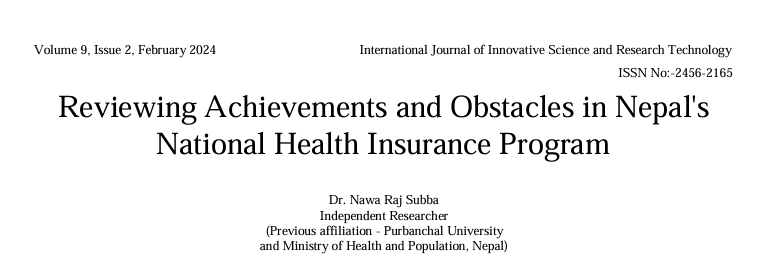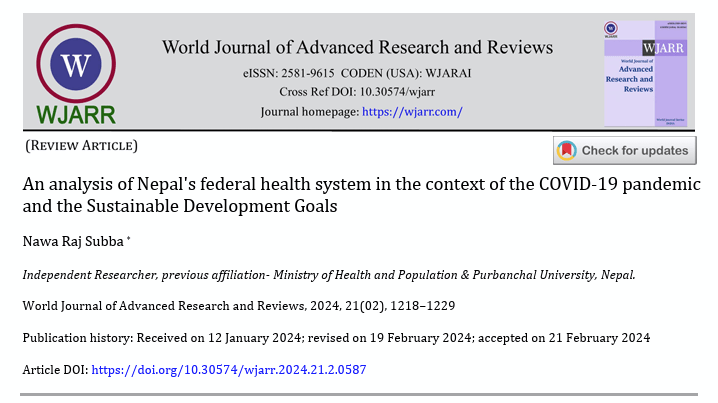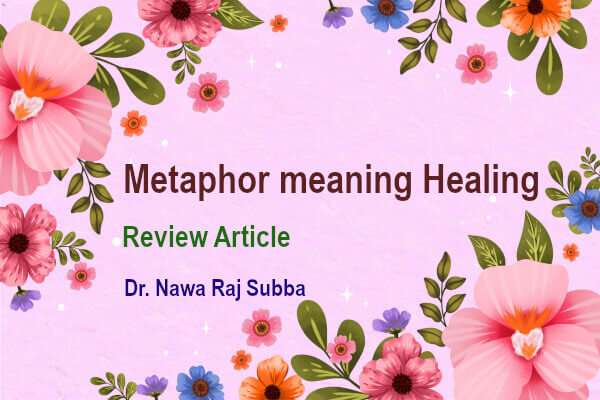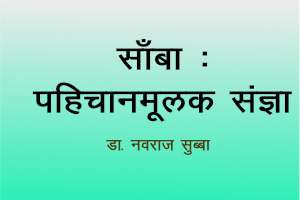Health Insurance Program Nepal

यो लेख नेपालको स्वास्थ्य बीमा कार्यक्रमको समीक्षा हो। यसमा नेपालमा बीमा कार्यक्रमको इतिहास, उपलब्धी र ब्यवधानका बारेमा अध्ययन गरिएको छ। सन् २०१६ देखि कार्यान्वयनमा आएको यस कार्यक्रमले हालसम्म करिव ७० प्रतिशत मानिसलाई दर्ता गरेको सरकारको दावी छ। यो कार्यक्रम लागु भएपछि प्राथमिक स्वास्थ्य सेवा लिन स्वास्थ्य संस्थामा सेवा लिनेको संख्यामा उल्लेख्य बृद्धि भएको तथ्यांक छ। एकातिर सरकारको दावीअनुसार यसले बृद्धवृद्धा, असहाय, सीमान्तकृतलाई ध्यानदिएको भनाइ छ भने अर्कातिर स्वास्थ्य सेवाको गुणस्तर, औषधीको उपलब्धता तथा सेवाको पहुँचमा कमी रहेको जनगुनासो पनि छ। राजनीतिक प्रतिबद्धता र सरकारको प्राथमिकता प्राप्त गरेको बीमा कार्यक्रमको आवश्यकतामा भने सन्देह छैन।
यस लेखमा
यस लेखमा नेपालको बीमा कार्यक्रमको बारेमा हालसम्म गरिएका अध्ययनहरूका आधारमा सूचना संकलन गरिएको छ। सरोकारवालसित गरिएको छलफल तथा पत्रपत्रिकामा प्रकाशित समाचार तथा रिपोर्ट एवम् सामाजिक सञ्जालमा ब्यक्त विचार र अनुभवलाई पनि अध्ययनको दायरामा ल्याइएको छ। संख्यात्मक तथा गुणात्मक सूचनालाई स्वट एनालिसित तथा तुलनात्मक अध्ययन विधिद्वारा विश्लेषण गरिएको छ।
आज पनि नेपालमा ६० प्रतिशत मानिसले आफ्नै खर्चमा स्वास्थोपचार गराइरहेको विश्व स्वास्थ्य संगठनको तथ्यांक छ। नेपालमा सरकारले स्वास्थ्य क्षेत्रमा आवश्यताअनुसार कुल ग्राहस्थ उत्पादनको ६ प्रतिशत खर्च गर्नुपर्ने विश्वव्यापी मापदण्ड भए तापनि करिव २ प्रतिशत मात्र खर्च सरकारले गरेकाले स्वास्थ्य क्षेत्रमा भनेजस्तो सुधार ल्याउन नसकिएको भन्नसकिन्छ। एकातिर स्रोतसाधनको कमी अर्कातिर भएका स्रोतको सदुपयोग नभएको, समान खरीदमा जोड दिइएको तर सदुपयोग नभएको पाइन्छ। यसको प्रभाव बीमा कार्यक्रममा पनि परेको छ। नक्कली बिलभरपाइ बनाएर सरकारसित रकम दावी गर्ने सरकारी र निजी स्वास्थ्य संस्थाको प्रवृत्ति रोक्न नसके कार्यक्रम धरासायी हुने निश्चित छ। यसमा सबै क्षेत्रको जागरुकता चाहिन्छ।
सुझाव
प्राविधक पक्षमा स्वास्थ्य संसथामा औषधीको समुचित प्रयोग अर्थात् रेसनल युज अफ ड्रग सम्बन्धी तालिमको आवश्यकता छ। जसले विरामीलाई अनावश्यक औषधी भिडाएर थप जोखिम र आर्थिक भारबाट रोक्न सकिन्छ। स्वास्थ्य संस्थामा उपचार गरिएका विरामीको पूर्जा तथा सम्बन्धित बिलभरपाइहरूको प्राविधिक परीक्षण (टेक्निकल अडिट) गर्ने व्यवस्था हुनुपर्दछ। सम्मूर्णको गर्न नसके नमूना संकलन (सेम्प्लिङ) विधि अपनाएर कार्य सम्पन्न गरेमा यसले गलत प्रवृत्तिको पहिचान र रोकथाममा सहयोग पुग्नेछ। यसैगरी कमसेकम वर्षमा एकपटक सेवाग्राही र सरोकारवालाबीच बसेर कार्यक्रमबारे छलफल गरी सामुदायिक परीक्षण (सोसल अडिट) गर्नुपर्दछ। यस व्यवस्थाले सरोकारवालालाई थप जिम्मेवार बनााउन बल पुर्याउँछ। बीमा कार्यक्रममा एक हेल्पलाइनको पनि आवश्यकता छ, जसमा सेवाको जानकारी लिन सकियोस र सेवामा देखिएका भोगिएका अनियमितता बारे जानकारी दिन सकियोस्।
IJISRT24FEB115Abstract
This is a review article on health insurance in Nepal. investigation aims to assess the country’s strengths and weaknesses and identify any roadblocks. It can slow its progress towards the Sustainable Development Goals by 2030.
Methods
The methodology includes a SWOT analysis, narrative Analysis. It includes synthesis techniques, incorporating data from public reports, websites, research, social media data, and stakeholder interviews.
Findings
The survey indicates that 70 per cent of Nepal’s populace possesses health insurance. There exists a disparity between urban and rural regions, resulting in protracted queues and inadequate availability of medications. Nepal’s health funding must match the World Health Organization’s out-of-pocket expenses and comprehensive health coverage projections.
Suggestions
The study recommends increasing healthcare spending from 2.4 per cent of GDP to 5-6 per cent. That ensures healthcare and its efficient mobilization receive 10-15 per cent of Nepal’s budget. The program’s investigations uncover deficiencies in quality, ineffectiveness, and fraudulent problems. It jeopardizes the sustainability.
The study concludes with recommendations for scholars and policymakers. It highlights enhancing resource allocation, monitoring and supervision, and implementing procedures to improve quality and decrease corruption. There is a need to ensure a technical audit of the program works, prescriptions, and bills regularly. The public hearing is required. Have to manage a support center.
Keywords— Health Insurance, Nepal, Universal Coverage, Coverage, Challenges



